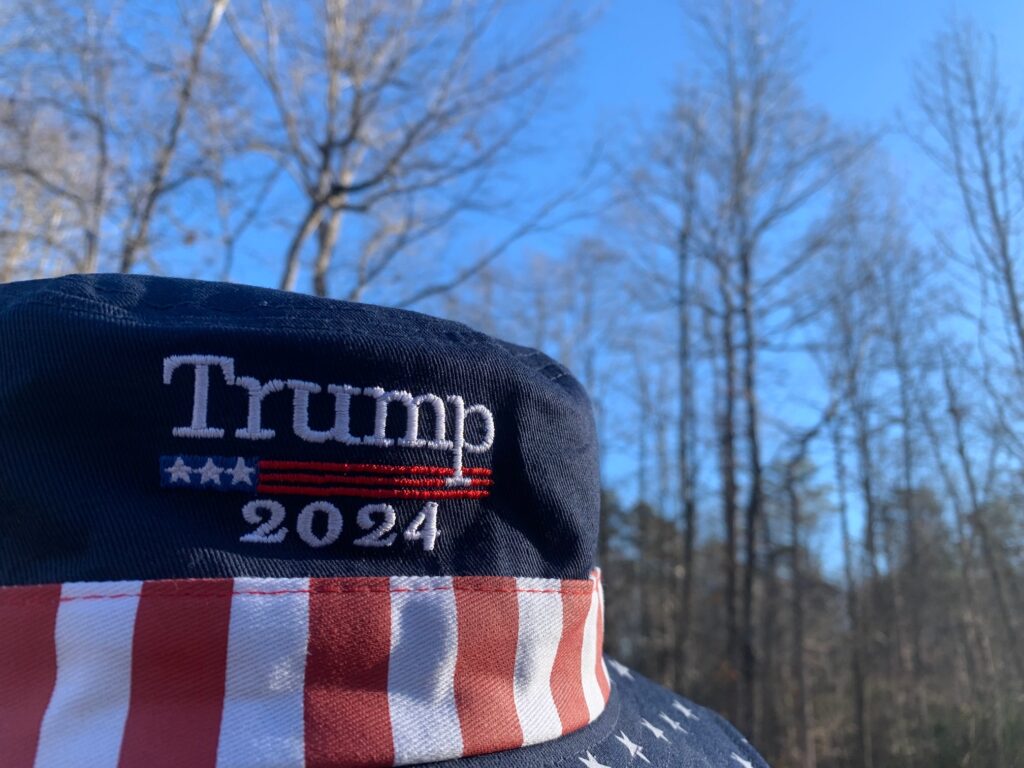
Let’s address the elephant in the room
Photo taken by author.
C.J. Eldridge, News and Features Editor
As the clock struck 12 on Dec 31, 2023, the 2024 election year was ushered in, bringing with it a maze of lawfare for the Republican party and their presidential frontrunner, former President Donald J. Trump, to navigate.
There were many candidates who threw their hat in the race in 2023. As of 2024, however, only six remained: Donald Trump, Ron DeSantis, Nikki Hailey, Vivek Ramaswamy, Chris Christie and Asa Hutchinson.
The Iowa Caucuses were a proving ground for many of them, leaving only Trump, Hailey and DeSantis standing by the end.
Ramaswamy ended his bid for the White House after his fourth place finish, endorsing Trump. Hutchinson dropped out after placing sixth. Christie concluded his campaign a few days before the caucuses.
DeSantis dropped out of the election on Jan. 21. He also threw his support behind Trump, who achieved 51% of the vote in Iowa and 54% of the vote during the New Hampshire primary on the 23. Only him and Hailey remain.
But Trump has a long way to go before the general election–and a number of court proceedings.
The states of Maine and Colorado made the decision to remove Trump’s name from the primary ballot. Trump is slated to make his appeal to the Supreme Court over this ruling. The states have argued the removal is based in Section 3 of the Fourteenth Amendment of the U.S. Constitution.
You can read this section here. This stems from Trump being accused of inciting an insurrection during the January 6 protests in 2021.
Writing in Trump’s name anyway wouldn’t work, according to Nicholas Higgins, the department chair of political science, criminal justice and legal studies. Ballots that had him as a write-in candidate would be void.
Trump also faces court cases in Georgia and New York, Higgins said.
The Georgia case is attempting to charge Trump via the Racketeer Influenced and Corrupt Organizations (RICO) Act. Their argument is that Trump conspired with others who were already charged with election interference within the state.
The U.S. Department of Justice’s website breaks down how the act is used: “The power of RICO lies in its conspiracy provision . . . that allows tying together apparently unrelated crimes with a common objective into a prosecutable pattern of racketeering.”
Moving to New York, Higgins said these charges are focused on Trump’s business dealings in the past. These are civil crimes, not criminal, so they would end in some sort of fine if Trump was proven guilty. The case is over him allegedly falsifying the value of assets.
The federal cases brought against Trump are where things get interesting. Higgins said that in many ways this is new territory for law in the country. Theoretically, if Trump were charged and won the 2024 election, he could pardon himself of federal charges.
This would not free him of state charges, but nothing in the Constitution says a president cannot run the country from a state prison. The founding fathers didn’t write in a provision that prevented a convicted criminal from running for office.
Higgins has his own beliefs for why this is: “They didn’t think the American people would vote in a criminal.” They trusted that the system would ultimately prevent this from happening.
It isn’t just the president voters will be choosing come November. Many lose sight of the local elections amidst the hubbub of the larger presidential election. Local offices will be on the ballot as well.
“The local elections matter way more when it comes to outcomes of lawmaking,” Higgins said.
Things that affect citizens on a daily basis, like schools and roads, come into play here.
Higgins said that many voters don’t know much about local elections or who they are voting for for them. These “down-ballot races” are generally decided by voters picking a straight ticket without giving much thought to it.
Many local and state offices still want their elections to coincide with the president. The turnout is far, far greater at this time.
The year is still young, with dozens of primaries and over ten months to go till November. South Carolina’s Republican primary is on Saturday, Feb. 24. The Democratic primary is on Saturday, Feb. 3.
If you want to read up more on the democratic side of things, check out Savannah Williamson’s article “Let’s address the donkey in the room, what is the Democratic party?”
